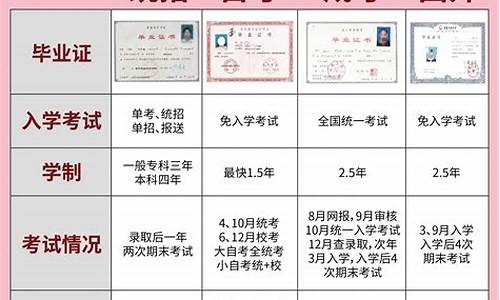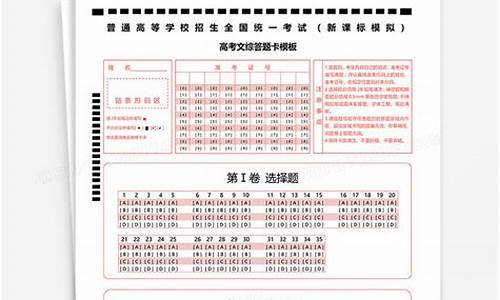您现在的位置是: 首页 > 教育政策 教育政策
高考主语从句_高考主语从句真题及答案
tamoadmin 2024-07-17 人已围观
简介1.高考英语语法:whatever,whoever,whichever引导名词性2.高考英语语法填空3.定语从句和主语从句的区别是什么4.主语从句问题 高考5.主语从句 虚拟语气should+he done 与should do 区别在哪里?6.主语从句一定要以陈述句形式出现吗7.高考英语。强调句,主语从句有什么区别,求简单重点讲解下 #高考# 导语英语是高考备考的重点,也是难点,很多词,英语易
1.高考英语语法:whatever,whoever,whichever引导名词性
2.高考英语语法填空
3.定语从句和主语从句的区别是什么
4.主语从句问题 高考
5.主语从句 虚拟语气should+he done 与should do 区别在哪里?
6.主语从句一定要以陈述句形式出现吗
7.高考英语。强调句,主语从句有什么区别,求简单重点讲解下

#高考# 导语英语是高考备考的重点,也是难点,很多词,英语易错词汇短语同学们分不太清楚,为帮助同学们解决这一重点难点, 考 网整理了《高考英语易错词汇短语辨析》,供参考。whatever,whoever,whichever引导名词性从句
一、基本用法概说
英语中的-ever 词主要包括 whatever, whoever, whichever, whenever, wherever, however 等,其中可引导名词性从句的主要有whatever, whoever,whichever.这里所说的名词性从句主要指主语从句和宾语从句,它们通常不用于引导同位语从句,同时也很少用于引导表语从句。如:
Whatever he said was right. 无论他说什么都是对的。(引导主语从句)
I don‘t believe whatever he said. 无论他说什么我都不信。(引导宾语从句)
在某些特定的语境中,也可用于引导表语从句。如:
What he wants to get is whatever you he. 他想得到的是你所拥有的一切。
二、whatever引导的名词性从句
whatever的意思是“所……的一切事或东西”,可视为what的强调说法,其含义大致相当于anything that,whatever在从句中可用作主语、宾语、定语。如:
Do whatever she tells you and you‘ll he peace. 她叫你干什么你就干什么,那你就太平了。
I don‘t believe in letting children do whatever they like. 我不赞成让孩子为所欲为。
Goats eat whatever food they can find. 山羊找到什么食物就吃什么食物。
三、whoever引导的名词性从句
whoever的意思“任何……的人”,在意义上大致相当于 anybody who.whoever在从句中可用作主语或宾语。如:
I‘ll take whoever wants to go. 谁想去我就带谁去。
Whoever says that is a liar. 说那话的人是个骗子。
She can marry whoever she chooses. 她愿意嫁谁就嫁谁。
I‘ll give the ticket to whoever wants it. 谁想要这票,我就把它给谁。
Tell whoever you like — it makes no difference to me. 你爱告诉谁就告诉谁吧,对我是无所谓的。
注:whoever既用作主语也可用作宾语(作宾语时不宜用whomever,因为在现代英语中whomever已几乎不用)。另外,注意以下受汉语意思影响而弄错的句子:谁赢了都可以获奖。
误:Who wins can get a prize.误:Anyone wins can get a prize.正:Whoever wins can get a prize.正:Anyone who wins can get a prize.
四、whichever引导的名词性从句
whichever的意思“……的那个人或事物”,在意义上大致相当于 the person or the thing that.whichever在从句中可用作主语、宾语或定语。如:You can pick whichever one you like. 你喜欢哪个就挑哪个。
Whichever of you comes first will receive a prize. 你们谁第一谁就能得奖。
We‘ll eat at whichever restaurant has a free table. 哪个饭馆有空桌我们就在哪儿吃吧。
Whichever of us gets home first starts cooking. 我们当中无论哪个先到家,哪个就先开始做饭。
五、引导状语从句的用法
whatever, whoever, whichever除用于引导的名词性从句外,还可用于引导状语从句,分别相当于 no matter what, no matter who, no matter which.如:I‘ll stand by you whatever [=no matter what] hens. 无论如何我都支持你。
Whoever [=No matter who] wants to speak to me on the phone, tell them I‘m busy. 不管谁要我接电话,就说我现在正忙。
Whichever [=No matter which] you buy, there is a six-month guarantee. 不管买哪个都有六个月的保修期。
高考英语语法:whatever,whoever,whichever引导名词性
主语从句不管是用连接词 that、if/whether,连接代词 what、who、which,还是连接副词when、where、why、how 引导,因为它不是提出问题,而是陈述一个已知的或未知的事实,因此都应该是陈述语序。
高考英语语法填空
一、基本用法概说
英语中的-ever 词主要包括 whatever, whoever, whichever, whenever, wherever, however 等,其中可引导名词性从句的主要有whatever, whoever, whichever。这里所说的名词性从句主要指主语从句和宾语从句,它们通常不用于引导同位语从句,同时也很少用于引导表语从句。如:
Whatever he said was right. 无论他说什么都是对的。(引导主语从句)
I don’t believe whatever he said. 无论他说什么我都不信。(引导宾语从句)
在某些特定的语境中,也可用于引导表语从句。如:
What he wants to get is whatever you he. 他想得到的是你所拥有的一切。
二、whatever引导的名词性从句
whatever的意思是“所……的一切事或东西”,可视为what的强调说法,其含义大致相当于anything that,whatever在从句中可用作主语、宾语、定语。如:
Do whatever she tells you and you’ll he peace. 她叫你干什么你就干什么,那你就太平了。
I don’t believe in letting children do whatever they like. 我不赞成让孩子为所欲为。
Goats eat whatever food they can find. 山羊找到什么食物就吃什么食物。
三、whoever引导的名词性从句
whoever的意思“任何……的人”,在意义上大致相当于 anybody who。whoever在从句中可用作主语或宾语。如:
I’ll take whoever wants to go. 谁想去我就带谁去。
Whoever says that is a liar. 说那话的人是个骗子。
She can marry whoever she chooses. 她愿意嫁谁就嫁谁。
I’ll give the ticket to whoever wants it. 谁想要这票,我就把它给谁。
Tell whoever you like — it makes no difference to me. 你爱告诉谁就告诉谁吧,对我是无所谓的。
注:whoever既用作主语也可用作宾语(作宾语时不宜用whomever,因为在现代英语中whomever已几乎不用)。另外,注意以下受汉语意思影响而弄错的句子:
谁赢了都可以获奖。
误:Who wins can get a prize.
误:Anyone wins can get a prize.
正:Whoever wins can get a prize.
正:Anyone who wins can get a prize.
四、whichever引导的名词性从句
whichever的意思“……的那个人或事物”,在意义上大致相当于 the person or the thing that。whichever在从句中可用作主语、宾语或定语。如:
You can pick whichever one you like. 你喜欢哪个就挑哪个。
Whichever of you comes first will receive a prize. 你们谁第一谁就能得奖。
We’ll eat at whichever restaurant has a free table. 哪个饭馆有空桌我们就在哪儿吃吧。
Whichever of us gets home first starts cooking. 我们当中无论哪个先到家,哪个就先开始做饭。
五、引导状语从句的用法
whatever, whoever, whichever除用于引导的名词性从句外,还可用于引导状语从句,分别相当于 no matter what, no matter who, no matter which。如:
I’ll stand by you whatever [=no matter what] hens. 无论如何我都支持你。
Whoever [=No matter who] wants to speak to me on the phone, tell them I’m busy. 不管谁要我接电话,就说我现在正忙。
Whichever [=No matter which] you buy, there is a six-month guarantee. 不管买哪个都有六个月的保修期。
定语从句和主语从句的区别是什么
转
what :单独使用,只能引导名词性从句,即主语从句、宾语从句、表语从句等,意思是什么(事、情况、内容等).例如:
What we need is more practice.主语从句
He told me what had hened to him on the island.宾语从句
This is what we he got from the project.表语从句
whatever :既可以引导名词性从句,也能引导让步状语从句,意思是无论/不管什么(事、情况、内容等)
---------------相互转化:只有在引导让步状语从句时,whatever=no matter what.
Whatever hens will never change my Chinese heart.主语从句
I'd like to do whatever I can to help you.宾语从句
---------------对比:
Whatever hens will never change my Chinese heart.
Whatever hens,it will never change my Chinese heart.
=No matter what hens,it will never change my Chinese heart.
主语从句问题 高考
这并不是一个问题,因为定语从句,从名称上就可以看出,做定语的,而主语从句是做主语的,属于名词性从句的一种,只要知道句子缺什么成分,就可以很容易判断到底是定语从句还是主语从句。说白了,这并不是一个问题。而另一个名词性从句——同位语从句,很容易和定语从句搞混淆。因为同位语同样有补充说明的功能。
1)定语从句(attributive clause),顾名思义,用一个句子做定语,用来修饰名词或代词,亦称关系从句(relative clause)。比如说,
I like music that I can sing along with.
that引导的从句是用来修饰music,做后置定语,也就是定语从句。
定语从句的引导词分关系代词(that, which, who,whom,whose)和关系副词(where, when),缺成分(成分即主谓宾)用关系代词,不缺成分用关系副词。关系代词引导的定语从句很常见,而且也很好判断,难的是区分关系副词引导的定语从句和状语从句的区别,eg.I was ten when I went to U.S. for the first time.(状语从句)
There was a time (when I felt in low spirits in my life).(定语从句)
第二句话会发现time是表语,后边没有说完,用一个句子补充说明具体内容——同位语从句或者修饰限定——定语从句,显然这句话属于后者。
2)同位语从句(ositive clause),即用一个句子做同位语,eg.
Nobody knows the news that she has already known the results.(没有人知道她已知道了结果这一消息。)
定语从句.:
Nobody knows the news that she has already known.(没有人知道她知晓的那条消息。)
很明显,在同位语从句中,news 不想当除引导词以外的其他成分,而在定语从句中,news 充当了从句的宾语,这就是二者最明显的区别。
3)主语从句(subject clause)
用一个句子做主语就是主语从句,这个很简单。Eg.
That she has gone to Seattle is known to us all.
有的时候主语太长 ,会用it做形式主语,真正的主语放在后边。Eg.
It is known to us all that she.has gone to Seattle.
定语从句是高中英语语法最重要的语法,也是高考最难的内容之一,主语从句的重要性远在定语从句、同位语从句、宾语从句之后。
主语从句 虚拟语气should+he done 与should do 区别在哪里?
这是关于特殊疑问句语序的问题。特殊疑问句有两种构成方式:1。当特殊代词在句中充当主语时要用正常语序构成特殊疑问句。例如:who needs to he a rest ? What is the matter ? What interested you ? Who knows the answer ? 2.若特殊代词在句中充当非主语,则用部分倒装语序,既一般疑问句语序。比如:What do you like ? Who did you love ? When are you free ?
Why did you do that ? How did you know it ? Where would you like to go tonight ?
您的问题一是宾语从句,从句要用正常语序。what was the matter,what是主语所以本来这就是正常语序构成的特殊问句。 第二个问题是同位语从句,what是关系引导词,用来引出从句,所以放在从句句首。
主语从句一定要以陈述句形式出现吗
主语从句 虚拟语气should+he done 与should do 区别在哪里?
两者,都表示该做却没做的事。
区别在于,should he done. 是对现在完成时的虚拟语气,对的发展造成的一定的影响,或既定效果。
should do. 是对一般现在时的虚拟。
虚拟不能说是对过去,现在,将来的虚拟,而是一种时态。由句意判断,这个句子表达的意思是发生在什么时候。
另外将来时态的虚拟,直接是 will, 或者现在进行时表示将来。
虚拟语气大概就这些了,也是语法中相对难的。,中,高考一般2题左右、
望纳
主语从句 虚拟语气 形式 should+动词原形 should+he done前者是说 现在应该做xxx
后者是悔过, 说 原来本应该做xxx.
虚拟语气中would could should might he done与had done都是表示过去,在用法上有何区别?像在主语从句在语气上比had更委婉,可用于其他人称,比如 You
虚拟语气should heI should he been angry.
should he+完成时态
在主语从句中it is+adj+that后不是加虚拟语气should+动词原形It is strange that he had made a mistake. 奇怪的是他犯了一个错误。
这是一个陈述句,就是陈述一个事实:他犯了错误让人有点奇怪。
It is strange that he (should) he made a mistake. 他居然犯了一个错误,真令人奇怪。
这是虚拟语气,说话者是在责备他本不应该犯错。
It is/was +形容词/名词+that主语从句多数情况下用虚拟语气,表达一种要求,命令或者责备,但是如果只是表示陈述一个事实而不是强烈的感情,完全可以用一般的陈述语气。
以下为词典原句:(不过考试建议你还是多用虚拟语气)
It is a shame that the rain spoiled our piic.
真可惜,这场雨把我们的野餐给搅了。
It is a pity (that) he lost so much money.
他损失这么多钱,真是遗憾。
He was a very bre man and it is surprising that he lived so long.
他是一个非常勇敢的人,而令人惊讶的是他活得那么长命。
It is strange that nobody knows where he lives .
真奇怪,谁也不知道他住在哪里。
附:虚拟语气用在主语从句中有以下几种情况:
1.在句型 "It is important (necessary, strange, impossible, natural) that .... " 中,that后面的从句中的谓语动词用:(should) + 动词原形。 如:
It's necessary that we should he a walk now. 我们有必要出去散散步。
It's natural that she should do so. 她这样做是很自然的。
It's important that we should take good care of the patient.
重要的是我们要照顾好病人。
2.在句型"It is a pity (a shame, no wonder, better) that .... "中,that 后面的从句中的谓语动词用: (should) + 动词原形。 如:
It was a great pity that you (should) he made so many mistakes in your math exercise. 太遗憾了,你居然在数学练习中犯了那么多错误
It will be better that she stay with her grandmother.
她和她的祖母在一起就好了。
3.在句型"It is suggested (requested, proposed, ordered) that .... "中,that 后面的从句中的谓语动词用:(should) + 动词原形。 如:
It was suggested that the sports meet be put off until next Saturday.
大家建议把运动会推迟到下星期六。
It is desired that we (should) get everything ready by tonight.
希望我们到今晚将一切准备就绪。
It was ordered that the medicine be sent there by plane.
命令马上用飞机把药送往那里.
(个人认为上面的第3种情况基本都要用虚拟语气,因为这里都是表示命令或要求,而第1和第2两种则视说话者要表达的意思决定。)
欢迎探讨词法语法问题。
i should do more than i do这是虚拟语气吗?和 i should he done more than i do 一样吗
都不是虚拟语气,楼上正解。SHOULD只有用在SUGGEST,WISH,DEMAND后年的宾语从句里才表示虚拟语气。
虚拟语气中的would/conld/should do/he done 与 did/had done有何区别前面一部分是用在后面的主句里。后面一部分是用在if条件句里的。
举个例子:
If she had reviewed the text yesterday, she would he passed the exam.如果她昨天覆习了课文,她是可以通过考试的。
在例句中,had reviewed用在if条件句中,would he passed用在主句中。
虚拟语气should do被动在被动式中用should be done
高考热点(⊙o⊙)~
形式为should (not)do…的宾语从句表示虚拟语气吗?要看前面的部分是什么。
若:i he told you that you shouldn't do this.句中的should仅仅表示应该的含义。为情态动词的考查范围。
如果与虚拟语气有关,比如:
it is high time that you should do your own work.
以上两句均为should做宾语从句的部分,但是很明显用法不同。
关于should,一般就考察做情态动词表语气如:you should he done this.表责备语气。或是考察关于虚拟语气:he requires that you (should) finish it.
should 和would在虚拟语气里面的区别should和would的用法:
should常译作“应该”,would常译作“愿意;会”。
1. should和would都可用于疑问句,表示征询意见或提建议。但它们比shall和will更委婉。如 Should we open the window? / Would you mind asking you so many questions?
2. should和would都可用于肯定句或否定句。
(1)should译作“应该”,表示义务或推测。如 We should protect our environment. (义务) / You shouldn’t know him. (推测)
(2)would译作“愿意;会”,表示过去的意愿或意志。 如 She said she would bee a volunteer. / He promised that he wouldn’t fall behind others.
3. should和would都可作助动词,它们是shall和will的过去式,用于过去将来时,译作“将要”。should用于主语是第一人称,would用于主语是任意人称。如 He said we should / would move to the second floor.
高考英语。强调句,主语从句有什么区别,求简单重点讲解下
是的,主语从句包含一个完整句子里所有必要的信息。
宾语从句
(1)对于宾语从句要掌握以下三点
①语序: 从句的语序必须是陈述句语序, 即“主语 + 谓语”这种形式。
②时态: 当主句是一般现在时或一般将来时的时候, 从句可以是任何时态, 而当主句是一般过去时的时候, 从句, 从句时态必须是过去时范围的时态, 即(一般过去时, 过去进行时, 过去完成时, 过去将来时)。
③连接词: 当从句意思完整, 主句意思肯定时, 连接词用that, 且可以省去, 当从句意思完整, 主句意思不确定或含否定含意时, 常用if或whether(是否), 当从句意思不完整时, 连接词则是代替不完整部分的特殊疑问词。
状语从句
(2)对于状语从句, 我们主要学习了时间状语从句和条件状语从句。对于这两种状语从句, 除了注意语序要用陈述句语序外, 在时态上尤其要注意, “主将从现”这种结构(即: 当主句是将来时态时候), 从句如果也要用将来时, 则必须用一般现在时代替一般将来时, 时间状语从句和条件状语从句的连接词通常为: when, while, as soon as, until和if。所以, 当连接词为以上五个词时, 如果主句是将来时, 就要考虑从句是否也要用将来时, 如果是, 则用“主将从现”结构, 其它还有由so…that…构成的结果状语从句, 由Though…或…but…, 构成的让步状语从句和由because或so构成的原因状语从句, 注意Though(虽然)与but(但是), because(因为)与so(所以)不能同时出现在句子里, 只用其中之一表达汉语中两个词的意义。
表语从句
在句子中起表语作用的从句叫做表语从句,位于主句系动词的后面。表语从句的引导词和主语从句的引导词相同。也是名词性从句的一种。
如:What What the police want to know is when you enred red the room警察想知道的是你什么时候进的房间。
The The trouble is that we are short of funds困难是我们缺乏资金。
This This is what we should do这是我们应当做的。
That”s s why I want you to work there那就是我要你在那儿工作的原因。
His His first question was whether Mr. Smith had arrived yet他的第一个问题是史密斯先生到了没有。
注意:从句中的疑问句用正常语序,即陈述语序。
as as if, as though, becau也可用来引导表语从句。
She She seems as if she had done a great thing她看起来好像做了一件大事。
It It is because you eat too much那是因为你吃得太多了。
同位语从句
一、在复合句中用作同位语的从句叫同位语从句。它一般跟在某些名词后面,用以说明该名词表示的具体内容。如:
I heard the news that our team had won.我听到了我们队获胜的消息。
I had no idea that you were here.我不知道你在这里。
二、可以跟同位语从句的名词通常有new,idea,fact,promise,question,dou,thought,hope,message,suggestion,word(消息),possibility等。如:
I’ve come from Mr wang with a message that he won’t be able to see you this afternoon. 我从王先生那里来,他让我告诉你他今天下午不能来看你了。
三、英语中引导同位语从句的词通有连词 that,whether,连接副词 how,when,where等。(注:if,which 不能引导同位语从句。)如:
l he no idea When he will be back.我不知道他什么时候回来。
He must answer the question whether he agrees to if or not.
他必须回答他是否同意这样一个问题。
四、有时同位语从句可以不紧跟在说明的名词后面,而被别的词隔开。 如:
Several years later,word came that Napoleon himself was coming to inspect them.
几年以后,有消息传来说拿破仑要亲自视 察他们。
The thought came to him that maybe the enemy had fled the city.
他突然想起可能敌人已经逃出城了。
五、同位语从匈与定语从句的区别。
1、同位语从句与前面的名词是同位关系,即说明它前面名词的内容;而定语从句与前面的名词是修饰与被修饰关系,即限定它前面的名词范围,或补充一些情况。如:
The news that l hove passed the exam is true.我通过了考试这一消息是真的。
(同位语从句,即从句所表达的意思就是前面名词的内容。)
The news that he told me just now is true.他刚才告诉我的消息是真的。
(定语从句,从句对前面名词起修饰限制作用,即“他告诉我的”那个消息,而不是别的消息。)
2、引导同位语从句的that是连词,在从句中不充当任何成份,而引导定语从句的that是关系代词,除起连接作用外,还在从句中充当主语、宾语或表语等。如:
The idea that computers can recognize human voices surprises many people.
计算机能够识别人的声音的想法使许多人感到惊奇。(that在从句中不充当任何成份。)
The idea that he ge surprises many people.他提出的观点令许多人感到吃惊。
(that在从句中作ge的宾语。)
定语从句(很麻烦的说~)
定语从句(Attributive Clauses)在句中做定语,修饰一个名词或代词,被修饰的名词,词组或代词即先行词。定语从句通常出现在先行词之后,由关系词(关系代词或关系副词)引出。
关系代词有:who, whom, whose, that, which等。
关系副词有:when, where, why等。
1. 关系代词引导的定语从句
关系代词所代替的先行词是人或物的名词或代词,并在句中充当主语、宾语、定语等成分。关系代词在定语从句中作主语时,从句谓语动词的人称和数要和先行词保持一致。
1)who, whom, that
这些词代替的先行词是人的名词或代词,在从句中所起作用如下:
Is he the man who/that wants to see you?
他就是你想见的人吗?(who/that在从句中作主语)
He is the man whom/ that I saw yesterday.
他就是我昨天见的那个人。(whom/that在从句中作宾语)
2) Whose 用来指人或物,(只用作定语, 若指物,它还可以同of which互换), 例如:
They rushed over to help the man whose car had broken down. 那人车坏了,大家都跑过去帮忙。
Please pass me the book whose (of which) cover is green. 请递给我那本绿皮的书。
3)which, that
它们所代替的先行词是事物的名词或代词,在从句中可作主语、宾语等,例如:
A prosperity which / that had never been seen before ears in the countryside. 农村出现了前所未有的繁荣。(which / that在句中作宾语)
The package (which / that) you are carrying is about to come unwred. 你拿的包快散了。(which / that在句中作宾语)
2. 关系副词引导的定语从句
关系副词可代替的先行词是时间、地点或理由的名词,在从句中作状语。
1)when, where, why
关系副词when, where, why的含义相当于"介词+ which"结构,因此常常和"介词+ which"结构交替使用,例如:
There are occasions when (on which) one must yield. 任何人都有不得不屈服的时候。
Beijing is the place where (in which) I was born. 北京是我的出生地。
Is this the reason why (for which) he refused our offer? 这就是他拒绝我们帮助他的理由吗?
2)that代替关系副词
that可以用于表示时间、地点、方式、理由的名词后取代when, where, why和"介词+ which"引导的定语从句,在口语中that常被省略,例如:
His father died the year (that / when / in which) he was born. 他父亲在他出生那年逝世了。
He is unlikely to find the place (that / where / in which) he lived forty years ago. 他不大可能找到他四十年前居住过的地方。
3 .判断关系代词与关系副词
方法一: 用关系代词,还是关系副词完全取决于从句中的谓语动词。及物动词后面无宾语,就必须要求用关系代词;而不及物动词则要求用关系副词。例如:
This is the mountain village where I stayed last year.
I'll never forget the days when I worked together with you.
我想告诉你这两者之间最大的区别是:
强调句一定是有结构it is/was that存在,而且把上述结构去掉之后,它整个句子的主谓宾都有,句子意思完整。
但是主语从句没有这样的特征,主语从句中,从句修饰的对象一定是做整个句子的主语。









